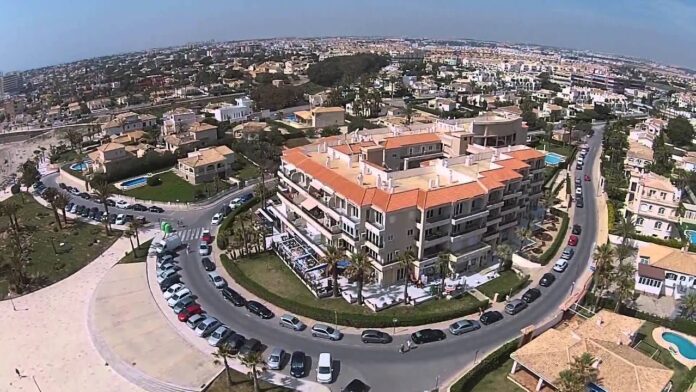A recent survey of the main coastal neighbourhood associations have given a negative assessment of the summer management of the coast by the Orihuela government, with shortcomings in the rubbish collection, presence of police and access to local beaches.
With high season coming to an end, many holidaymakers have now packed their suitcases and returned home. This has certainly happened in Orihuela Costa, where the summer has, by no means, been free of problems.
The most significant were the temporary closure of Cala Mosca and La Glea due to pollution, but for the most part, it has been a summer much the same as any other for most residents, both bad and good.
In a recent survey the main neighbourhood associations on the coast have taken stock of the holiday season with a rating that awards a mark of 3.43 out of 10 to the municipal managers for their summer efforts.
The spokesperson for the Federation of Associations of Orihuela Costa (FAOC), Lola Henarejo, said, “I think that this year it has not been hotter than last and although the management of services been no worse it has certainly been no better.”
“There has still been the lack and replacement of containers, poor street cleaning,” she says, as does the head of the Punta Prima Residents’ Association, Cristóbal Melgarejo, who, as the only positive note, said that there has been a greater diligence in the collection of pruning.”
In the specific case of Punta Prima, Melgarejo stated that residents continue to feel “isolated” from the rest of the coast due to the lack of public transport that connects them, for example, to the hospital and also, he adds, the lack of any form of local enttertainment. “The absence of a beach bar and the lack of a lift down the beach has caused great inconvenience. There have also been no sports activities on the beach and issues such as the beach wall, with the rocks in an unstable position, and the regression of the beach itself, need to be reviewed.”
Melgarejo also spoke of the absence of the Local Police, something that the residents further south on the Orihuela Costa have also felt.
The president of AVA Campoamor, Paloma Carbajosa, calls for more diligence regarding noise pollution. “The Police must be more vigilant with the premises and their noise, which affects the rest of the residents. Also, with the vehicles that tour the streets with megaphones offering, for example, upholstery services. We constantly call the Police, but they rarely come and we don’t understand why they are not sanctioned.
On the positive side, she congratulated the Council for responding to her request to pedestrianise Calle Gustavo Adolfo Becquer, creating a new axis for leisure venues. However, she points out that there are many damaged pavements in the area as well many others scattered around Campoamor. “In addition, there is not a single litter bin and the signage should be improved when the street is pedestrianised in the summer.”
Apart from waste management – a real common problem for coastal residents – Campoamor is still plagued by the breakdown of the lifts in Barranco Rubio. Carbajosa points out that this is the last straw for beaches that, she says, that desperately need to improve their accessibility.
The president of the Cabo Roig and Lomas Residents’ Association, Tomás Moreno, agrees with this. “This was confirmed by a study by our association, which shows that accessibility is lacking on practically all of our beaches. And, as if that were not enough, no specific allocation has been made for this in the municipal budget,” he states.
Moreno also emphasised the lack of materials provided to the company responsible for the road maintenance contract and demands speed in the implementation of the municipalisation of the green area maintenance service approved in plenary, where all the neighbourhood speakers agree on a serious deterioration. “It should have started operating several months ago, according to the forecasts announced by the government team,” Moreno complains.
However, none of the local authorities, in their overall assessment, gave the municipal management a pass grade. Henarejos gave the local executive a 4 out of 10. “It is fair to say that the City Council has not met the expectations of its residents and, despite the fact that we are aware of the commitment and personal effort of many people in the governing team, the management of basic services this summer can only be described as inadequate.”
Carbajosa from Campoamor has the same opinion. “The services continue to be poor mainly because of the garbage collection and cleaning, which is the most important need. It is true that there is a will to allocate more technical and human resources, but it remains to be seen,” she says sceptically.
The highest mark is given by Melgarejo, representing the residents of Punta Prima, a 4.25. “The City Council has not been as effective as they promised they would be. Even so, we want to continue maintaining our trust in our local institutions and we hope that the contracts with ILDO (green areas) and SURPAL (garbage) will be implemented very soon and that in the first months of 2025 we will see a change on the coast.”
The current municipal administration is very close to zero, according to the president of AVCRL, Tomás Moreno, with a score of 1.5. “At the moment, and depending on what happens in the next three years, the residents feel that the expectations generated by the current government team have been disappointing in view of the few achievements made. And they are fed up with so many unfulfilled promises. And anyone with a minimum of experience knows that if you don’t get on top of it at the beginning of the legislature, you re unlikely to be able to do so later.”





